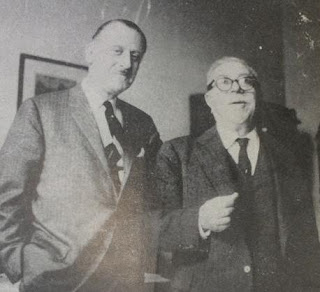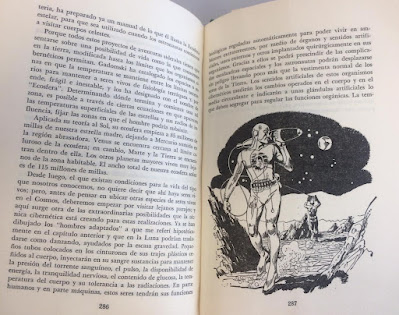 |
| Aldunate Phillips (left) with Norbert Wiener |
This is where the figure of Arturo Alduante Phillips (the author’s father) comes in. A writer-poet and engineer, Aldunate worked for the Electricity Company in Chile (later Chilectra) and as a university lecturer teaching courses in cybernetics. Even more significant, he published two books on cybernetics, Los robots no tienen a Dios en el corazón (Robots do not have God in their hearts) (1963) and Por las fronteras de la cibernética (On the frontiers of cybernetics) (1973). In the first of these books, published in the same year as Elena’s story, Aldunate Phillips explains the fundamentals of cybernetics and the current state of the discipline in relation to machine intelligence, as well as discussing the implications for industry, construction and healthcare. A contemporary review remarks that the book will be of interest to readers who want to know more about how today’s scientific developments will contribute to ‘the material progress of the world and the social transformation that will follow from their application’.
 |
| Pages from Los Robots (1963) |
In this context, the reference to cybernetics in Juana appears to be less incidental, as it seems likely that the topic was discussed in Elena Aldunate’s family. There is one moment in the story that especially chimes with the issues and debates covered by Aldunate Phillips in his book. Juana remembers some articles she's read in the newspapers: ‘One day the machines will rebel against their masters. They will not depend on them, they will take control of their future’. By contrast, Los Robots is dismissive of the idea of autonomous automated life. One of the concluding remarks in the book reads ‘I believe that it will never be given to the machine to replace the capacity of the human brain, which will continue to be the inspirer, the guide, the one that will have to manage the world of machines’. The message of Juana is more ambiguous and can be read as a cautionary tale. In the final passages, in the consummation of Juana’s desire, she is simultaneously released and obliterated by the machine’s motions: ‘The movement demands surrender […] its expression is burning, lacerating’. An interpretation of this ending might be that humans underestimate machines at their peril, with Juana’s fate serving as a warning about the destructive tendencies of automation…

No comments:
Post a Comment